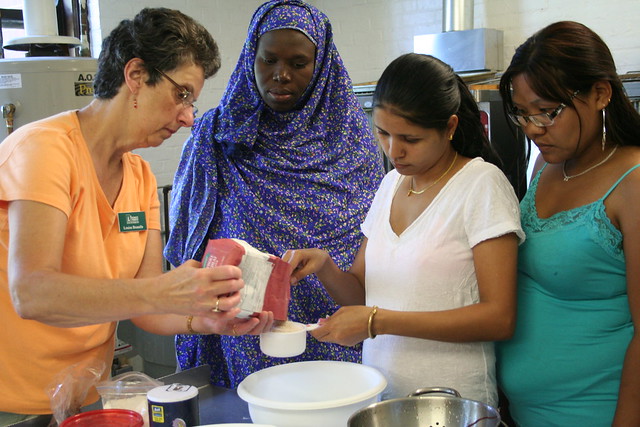
Millions of Americans struggle every day to make ends meet, and every day there are people helping them to lead healthier lives.
For 50 years, educators from the nation’s land-grant universities have brought EFNEP – the Expanded Food and Nutrition Education Program – to low income Americans, giving them the tools they need for better eating and health.
Through the shared leadership of USDA’s National Institute of Food and Agriculture (NIFA) and program directors nationwide, EFNEP’s educators provide tailored lessons on diet quality and physical activity, food resource management, food safety, and food security to meet the specific needs of their respective program participants.
“EFNEP’s uniqueness lies in its deep community roots, university connections, and in hiring and training peer educators from local communities to teach low-income families to develop healthier behaviors,” said Helen Chipman, NIFA national program leader for food and nutrition education. “EFNEP combines hands-on learning, applied science, and program data to improve effectiveness, efficiency, and accountability.”
EFNEP educators from the extension services of 76 land-grant colleges and universities have reached over 33 million people in all 50 states, six territories, and the District of Columbia since 1969 – nearly matching the combined populations of Iowa, Illinois, Indiana, and Ohio in 2018.
Examples of EFNEP success are abundant:
“Since 2006, EFNEP has reached 3,785 families across Black Belt counties of Alabama,” said Eunice Bonsi, family life and nutrition specialist with Tuskegee University Extension. “Families in low-income communities increased access to healthy foods through gardening and farmers’ market collaborations, and gained food security and resource management skills.”
In Maine, “Childhood obesity trends put a strain on health promotion programs and raise health care cost for the nation,” said Kate Yerxa, associate extension professor at the University of Maine. EFNEP has improved the physical activity, food selection, and preparation practices of children who participate in the program.
“EFNEP is helping North Carolina families become food secure,” said Lorelei Jones, North Carolina State University’s EFNEP coordinator. “Participants learn how to eat healthy and save money on their food purchases.” One Surry County participant stated that she went from spending $200 per week on groceries to spending less than $100 per week.
In Florida, the EFNEP supervisor for Palm Beach County established a curriculum to serve the needs of county’s Haitian community and created a partnership with a local food bank for weekly deliveries of locally grown produce, empowering program participants to cook nutritious meals.
“EFNEP epitomizes what can be achieved when science and informal education come together,” Chipman said. “EFNEP exemplifies how science with purpose can achieve tangible positive outcomes for families, communities, and society.”
NIFA invests in and advances agricultural research, education, and extension and seeks to make transformative discoveries that solve societal challenges.



